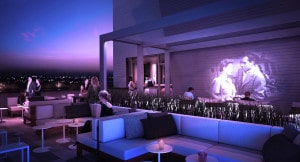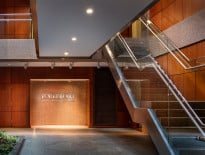
Smaller guest rooms and high-energy public spaces are common in a wave of new hotel brands under development in Greater Boston. London chain Yotel, which opens its Seaport District property on June 22, includes a 12,000-square-foot roof bar and lobby workspaces.
Just like office space and apartments, hotels are changing to reflect the preferences of Millennials. For the lodging industry, that means a shift toward do-it-yourself check-ins, smaller and less expensive rooms and high-energy common areas that convert from breakfast bars to co-working spaces to nightclubs after dark.
An infusion of independent hotels and brand extensions by major chains is changing the face of the Hub hospitality market. New flags making inroads in Greater Boston include Yotel, Hyatt Centric, citizenM, AC by Marriott and Moxy Hotel, another new Marriott concept.
While they cater to younger, sophisticated business and leisure travelers, many of the new lodging templates have the added benefit of reducing development and operating costs in one of the nation’s most expensive and high barrier-to-entry markets. Limited-service formats with minimal meeting space enable developers to colonize former office buildings or shoehorn construction onto smaller city lots.
“They’re targeting a specifically younger demographic who are much less concerned with the size of the room and want quick check-ins and a less expensive rate,” said Rachel Roginsky, owner and principal of Boston-based hospitality consultants Pinnacle Advisory Group.
Common Areas As Revenue Generators
Low-key hotel bars are giving way to destination nightclubs and roof bars drawing in tourists and office workers from surrounding neighborhoods.
As London-based chain Yotel prepares for the June 22 opening of its 326-room hotel in Boston’s Seaport District, much of the buzz surrounds the 11h-floor indoor-outdoor sky lounge. The popularity of the nearby Envoy Hotel’s Lookout Rooftop Bar illustrated the potential for hotels to maximize revenues from non-guests, Roginsky said.
Designed by Stantec, the Yotel maximizes the use of a rectangular sliver of land on the edge of the historic Fort Point neighborhood. The lot, previously used for surface parking, was created by the realignment of Seaport Boulevard during the Big Dig, and was unsuitable for other uses such as multifamily housing, said Larry Grossman, a senior principal with Stantec.
“We had studied a number of uses and we were going to do residential microunits, but as it unfolded the hotel was a perfect fit because the (guest rooms) are only 17 feet deep,” Grossman said. That enabled architects to lay out rooms on both sides of a 6-foot corridor in a 99,000-square-foot building that’s just 45 feet wide.
Yotel saves space in what it calls its “cabins” – a nod to quarters on cruise ships – with automated fold-out beds and skipping closet space in favor of wall hangers. Decor makes for a hip and modern look, but not one where guests are likely to linger, Grossman said. Lounge and co-working space that makes up the bulk of the ground floor compensates for the rooms averaging 175 square feet, compared with 325 to 350 square feet in traditional hotels.
“The smaller rooms naturally drive guests to the revenue-generating communal spaces: the lobbies, the bars and the roof decks,” Roginsky said.
Mobile apps enabling guests to check in via smartphones shave labor costs. Dutch chain citizenM, which has leased space at The Hub On Causeway development at North Station, doesn’t have a traditional front desk. Many of its nine properties in Europe and a new hotel under construction in New York’s Bowery section use modular construction techniques.
Technology also favors the prospects for little-known brands to attract first-time business. While travelers once shied away from unfamiliar brands, online consumer reviews give them the confidence to stray from tried-and-true chains.
Central Location, Full-Sized Rooms
The latest new hotel brand coming to downtown Boston, the 190-room Hyatt Centric at 68 Devonshire St. in the Financial District, doesn’t skimp on room size or amenities. Hyatt’s newest urban format, the full-service Centric brand, has full-sized guest rooms and an “upper-upscale” market niche, said Sebastian Colella, a vice president at Pinnacle Advisory Group. As the name suggests, Centric hotels tend to be located in central business district locations: in this case, converted office space in former Fidelity Investments buildings.
New formats are testing the waters beyond revitalized urban neighborhoods.
In Burlington, a 147-room Archer Hotel will open in early 2018 at Nordblom Co.’s 3rd Ave. retail development. The boutique chain, which has five other locations open or under development from Napa, California to Manhattan, is a new concept by Wichita, Kansas-based LodgeWorks Partners, founder of the Residence Inn chain.
“It’s really satisfying the new traveler: the person who wants a cool room, a cool bar: an ambience lifestyle hotel,” said Denny Meikleham, a managing director at HFF in Boston and former development executive with LodgeWorks. “They’ve got a great health club but not a lot of meeting space. It’s the Millennials’ hotel.”




 |
| 



